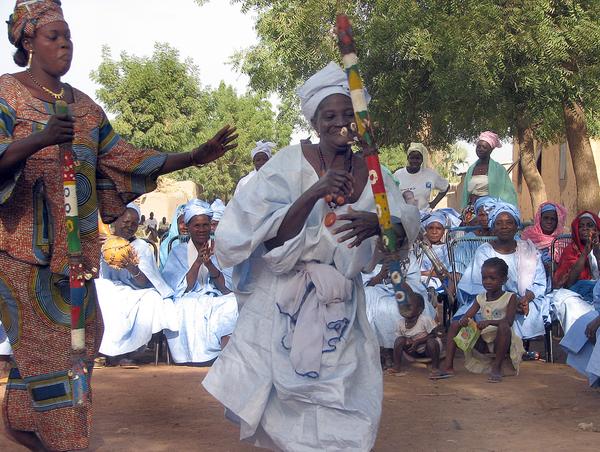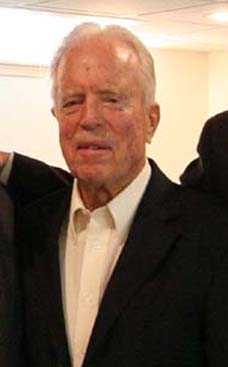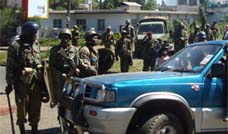
While polygamy is the cultural norm and women are subservient to men, Ellen said Mali is a relatively safe place for women. The Malians are predominantly Moslem and observe the strict religious edict of not drinking alcohol, thus reducing the types of crime associated with it. In addition, while Gretchen teaches Malians the importance of hygiene and how to prevent diseases like AIDS, the Malians are, by and large, an extremely clean people. Ellen said they take sponge baths twice a day. She said her daughter is surprised at how much the surgeons and nurses are able to do in the hospital with so little in the way of resources. Hospital staff is well-versed in the need to sterilize surgical and other equipment. And the hospital performs a lot of Cesarean sections and cataract surgeries. There are also the exceptions to the norm, as with any culture. Ellen said Gretchen has bonded with a Malian couple that does not adhere to the polygamous lifestyle. This hospital worker has only one wife and eats out of the bowl with her. The rule for most Malians is the men eat first out of the large serving bowl, and then the women eat. This couple is well-educated, and Ellen said more Mali men are becoming educated, and these educated men are often monogamous and more respectful to their wives.
Gretchen Snoeyenbos serves as a Peace Corps Volunteer in Mali
Mission to Mali
By Emily Wilcox
Wed Feb 20, 2008, 10:18 PM EST
The men have multiple wives, and 25-year-old Gretchen Snoeyenbos is considered a bit odd because she’s not married and isn’t having a brood of children.
Here in the subtropical, arid world of Dioila in Mali, Africa, the temperature never dips below 60 degrees, and an American woman on a Peace Corps mission is in the last legs of her two year stay.
Gretchen Snoeyenbos, of Halifax, completed her bachelor’s degree in history at Mount Holyoke College before flying to Biloxi, Miss., to help communities ravaged by Hurricane Katrina. The experience bolstered her confidence, and she decided to tackle something even harder – the Peace Corps. She found herself in the village of Dioila, Mali, helping a community build latrines, plant vegetable gardens for cash crops and teaching the locals about hygiene and other disease preventive measures.
“She’s a community organizer,” her mother, Ellen Snoeyenbos said. “She’s the first Peace Corps volunteer in that town. She has a desk in the hospital and tries to figure out their needs and helps to fill them.”
She’s actually helping the people of Dioila help themselves, and she’s getting a hand from a network of devotees across the Atlantic Ocean.
Kingston, Duxbury and Halifax residents have donated money to the cause, helping to build needed latrines in Dioila. Family connections link these towns, from the family home in Halifax, to the family church in Kingston (First Parish, where a fundraiser concert was held last fall for Gretchen’s project), and Ellen’s work as young adult librarian at the Duxbury Free Library.
Gretchen is currently working with a women’s garden collective, a task that required she approach the village chief to ask for land. Meanwhile, back at home, her fifth grade teacher Bob Dray is keeping in contact with her and sharing her experiences and worldly knowledge with his class in an educational program called Worldwise.
Ellen Snoeyenbos has just returned with her husband, Craig, from visiting her daughter in Mali, where she says they ate a lot of rice with sauces. The community killed a goat to honor the Americans with a special meal, and a trip to Timbuktu involved an overnight stay in an Arab encampment. It was the second time Gretchen’s parents had visited her in Africa, and the experience has broadened their perspective as well as their daughters’.
While Mali is a stable democracy and pro-American, the country’s healthcare and economy are sub par. The realities of a world without ambulances was brought home to Gretchen the day she boarded a bus to Bamako. The bus stopped along its route to let a father and sick son off. Gretchen watched as the man carried his beloved boy and laid him in the shade of a tree. To her horror, she realized the boy, just 13, was dead. He had died enroute to the Bamako hospital.
And there are many dichotomies in this country that is a world away from Gretchen’s hometown.
While polygamy is the cultural norm and women are subservient to men, Ellen said Mali is a relatively safe place for women. The Malians are predominantly Moslem and observe the strict religious edict of not drinking alcohol, thus reducing the types of crime associated with it.
In addition, while Gretchen teaches Malians the importance of hygiene and how to prevent diseases like AIDS, the Malians are, by and large, an extremely clean people. Ellen said they take sponge baths twice a day. She said her daughter is surprised at how much the surgeons and nurses are able to do in the hospital with so little in the way of resources. Hospital staff is well-versed in the need to sterilize surgical and other equipment. And the hospital performs a lot of Cesarean sections and cataract surgeries.
There are also the exceptions to the norm, as with any culture.
Ellen said Gretchen has bonded with a Malian couple that does not adhere to the polygamous lifestyle. This hospital worker has only one wife and eats out of the bowl with her. The rule for most Malians is the men eat first out of the large serving bowl, and then the women eat. This couple is well-educated, and Ellen said more Mali men are becoming educated, and these educated men are often monogamous and more respectful to their wives.
Gretchen has another six months to go on her mission, but she’s already feeling nostalgic for the time she’ll have to leave. Ellen said she has made quite an impact on these Malians as they have impacted her. These are friends she will never forget.










